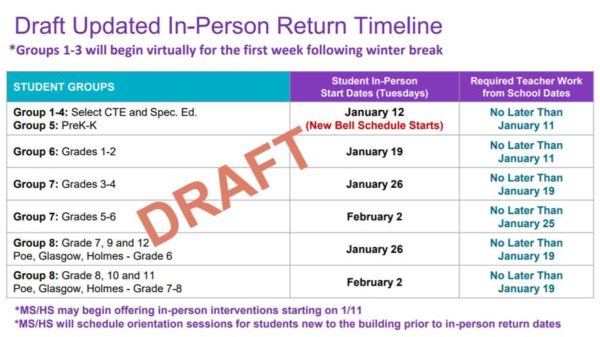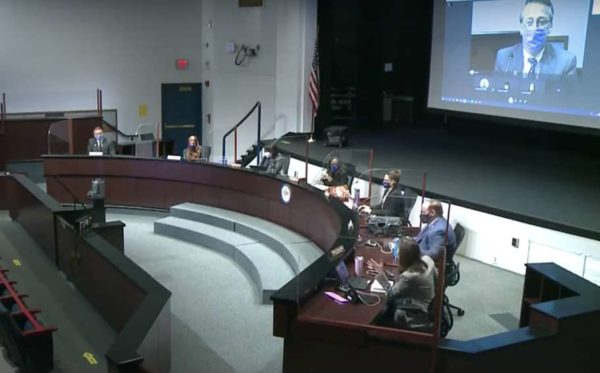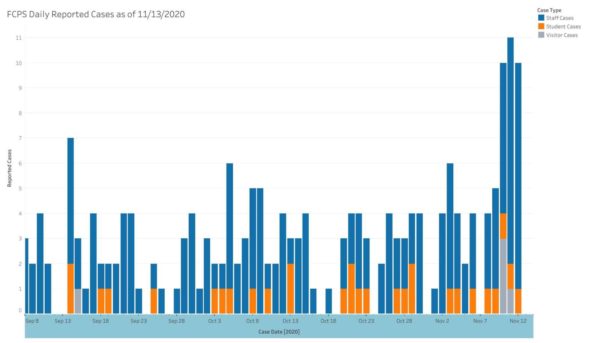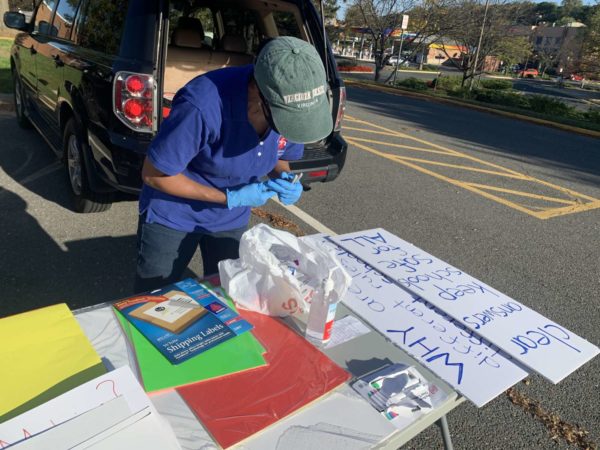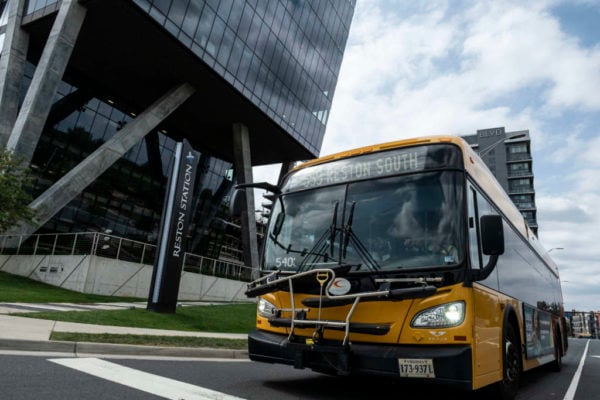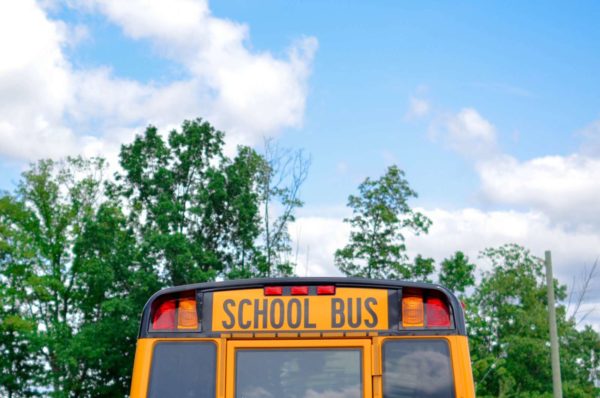Fairfax County Public Schools could start expanding in-person learning to more students again in January.
Under a draft timeline that FCPS Superintendent Scott Brabrand presented to the county school board last night (Thursday), all students will learn virtually for the first week after winter break, which lasts from Dec. 21 through Jan. 3.
Students who opt for hybrid in-person/virtual learning would then begin returning to school buildings on Jan. 12, starting with five cohorts that encompass pre-K and kindergarten students, as well as students in special education, English learners, and other specialized programs.
Elementary school students will be phased in, two grades at a time, between Jan. 19 and Feb. 2. Middle and high school students have been split in two groups, with seventh, ninth, and 12th graders returning on Jan. 26, and eighth, 10th, and 11th graders returning on Feb. 2.
“This plan is contingent on health and operational metrics being met,” Brabrand emphasized. “We’ll provide the board an update on this plan on Jan. 5 at our next monthly return-to-school work session and as needed as we get closer to the target dates for the groups.”
During the school board work session, Brabrand also laid out plans for a revised bell schedule to accommodate the increased time and reduced capacity needed to transport students to school by bus, a change that he acknowledged will present challenges for some families and employees.
“However, it is the only way we can return all of our grade levels back to in-person following health and safety guidance,” he said.
To address concerns about students falling behind academically while learning online, FCPS will loosen its grading policies and implement a system of interventions to give more individualized support to students who are struggling. English learners and special education students will also receive targeted support, including teacher-family conferences and regular check-ins.
Brabrand’s Dec. 10 presentation represents represent FCPS’s first concrete effort to resume a process that began on Oct. 5 but was suspended on Nov. 16 after Fairfax County’s COVID-19 caseload exceeded established thresholds for phasing students back into in-person learning.
Whether the new Return to School plan will actually come to fruition as proposed remains to be seen, as the Fairfax Health District continues to report record levels of COVID-19 transmission.
Brabrand alerted the school board that about 4,100 students are on track to revert back to all-virtual learning on Dec. 14, because tomorrow could mark the seventh day in a row where the county averages more than 200 new cases per 100,000 people and has more than 10% COVID-19 tests come back positive over a two-week span.
The superintendent said that FCPS has already sent letters to families whose students will be affected letting them know that a return to virtual learning could happen, though it will be confirmed on Saturday.
School officials have stressed the importance of mitigation strategies, such as social distancing and face mask requirements, to reduce the risk of COVID-19 spread and avoid the need to return all students to distance learning. FCPS announced earlier this week that it is assembling safety teams to monitor adherence to public health protocols at schools that have reopened.
However, the Fairfax County Federation of Teachers reported yesterday that it had recorded 72 safety violations since Oct. 23 through an online safety violation tracker. Members also reported in a survey conducted by the labor union that they have not seen consistent use of masks, social distancing, respiratory etiquette, and proper cleaning and disinfecting practices.
Since Sept. 8, FCPS has recorded 454 COVID-19 cases out of 12,104 in-person students and staff, a more than 3% positivity rate.
The FCFT argues that FCPS should transition all students and staff to virtual instruction until Fairfax County’s COVID-19 positivity rate drops below 5% and all of its standards for a safe reopening are met.
“FCPS’ introduction of a ‘mitigation strategies’ metric is important, but should not be prioritized over community spread of COVID-19,” FCFT President Tina Williams said in a statement. “…Our schools are part of our community and if COVID is spreading in our community, that means it is spreading in our schools.”
Fairfax County Public School administrators are looking to write a new policy that will ban secluding children across the division by 2023.
The new policy governing when and how children can be restrained or secluded would also require administrators to contact parents the day of an incident and to review data every quarter. After being restrained or put in a room alone, students would meet with a trusted staff member who could provide positive supports.
“We are delighted that FCPS recognizes that they were in shocking non-compliance with federal regulations,” Fairfax County Special Education Parent-Teacher Association President Michelle Cades told Tysons Reporter. “We are really optimistic that reporting is going to improve and that there is going to be more transparency.”
According to the policy, starting in 2021, seclusion will only be allowed at Burke School and Key and Kilmer Centers.
“We’re requesting that it be prohibited in 99% of schools now, but 100% is our desire, 100% is our goal,” Assistant Superintendent of the Special Services Department Michelle Boyd said in a work session last week.
The policy would go into effect Jan. 1, 2021, and includes some clauses that respond to feedback from parents and other stakeholders. FCPS will hold a public hearing on the new policy on Friday.
These changes come one year after a 2019 WAMU investigation found hundreds of instances of restraint and seclusion in FCPS, even though the school division had not reported a single incident to the U.S. Office of Civil Rights for 10 years.
“We have to make sure that people feel confident, not just in the new policy, but that we are implementing the data collection with fidelity,” Superintendent Scott Brabrand said during a Dec. 1 work session. “We have to acknowledge that for too many years, we reported no information, as did other school districts, and it was wrong.”
At-Large School Board Representative Abrar Omeish questioned what data FCPS is relying on to be confident that a new restraint and seclusion policy will be implemented properly.
“I worry about relying on this information, when we have reason to believe that it is not reliable,” she said. “We should imagine the worst-case scenario and put in place the checks that are going to hold us accountable to make sure we’re not wronging kids in the process.”
The school board and community members both raised concerns about an initial draft of the policy that was released prior to the Dec. 1 work session. That version gave a window for notifying parents of two school days, did not prohibit supine restraints (where the child is lying face-up on the ground), and had no explicit mention of eventually banning seclusion at all schools.
SEPTA criticized the initial proposal as failing to meet state regulations and best practices, saying that it “appears to discriminate against students with disabilities.”
“Given [the county’s] history, the public and the special education community of Fairfax County do not have faith that FCPS will act with integrity and transparency in any use of restraint or seclusion,” SEPTA said in a statement.
School board members argued that same-day notification in particular should be a priority.
“I can’t find that it is tenable that this school system is capable of notifying parents when there is a discipline issue or a health issue, but we’re not going to notify if their child has been restrained or secluded,” Braddock District School Board Member McLaughlin said.
The most recent draft of the proposed policy was released on Dec. 4 and incorporates some of the school board’s requested changes, including the same-day notification requirement and a ban on supine and prone restraints.
“They went back and, it looks like, put a lot more thought and consideration into how the regulations will be implemented here in Fairfax,” Cades said. “[Supine and prone restraints], where you have multiple people forcibly holding a child down on the floor, are more dangerous. You have a much greater likelihood of injury or death.”
Omeish said during the school board’s Dec. 3 meeting that she will likely be bringing a motion to “ban seclusion and to replace the rooms with sensory rooms.”
SEPTA is encouraging the community to register to speak at the public hearing. The group is facilitating anonymous participation ahead of the public meeting, where volunteers could read testimonies from parents.
Photo via FCPS
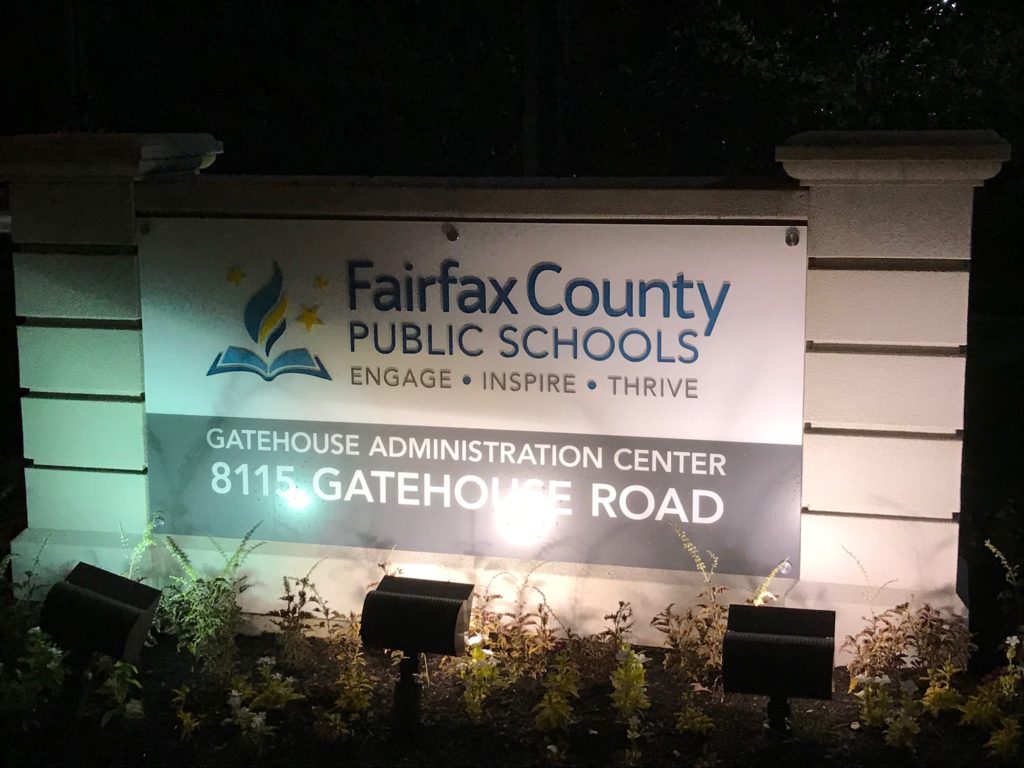
Fairfax County Public Schools administrators reaffirmed their commitment to bringing more students back for in-person learning during a Fairfax County School Board work session last night (Thursday), despite increasing levels of COVID-19 transmission in Northern Virginia.
After introducing more than 8,000 students to hybrid learning – which consists of two days of in-person instruction and two days of virtual instruction – over the past month, FCPS is preparing to welcome an additional 6,800 students back into classrooms on Nov. 17, Superintendent Scott Brabrand told the school board.
Under a newly revised timeline, another cohort of approximately 13,500 students, including first and second-graders as well as students with disabilities, will start hybrid learning on Dec. 8, a week later than previously proposed.
Students in grades three to six will now be phased in on Jan. 12 instead of Jan. 4. Middle and high school students are still scheduled to return on Jan. 26.
“As we make preparations for additional students and staff to return, we are very mindful of the national, state, and local COVID trends,” Brabrand said. “COVID remains a fluid situation, and I want to emphasize these are my recommendations as of today, this evening.”
For now, FCPS will forge ahead with its Return to School plan even as COVID-19 cases rise in Fairfax County at a rate not seen since early June and the public school system reports its first outbreaks of the pandemic.
According to FCPS, Justice High School in Falls Church and Woodson High School in Fairfax had outbreaks on Nov. 10 that involved staff members, but no students. An outbreak is defined as more than two cases of COVID-19 that are epidemiologically linked.
FCPS sent out letters reporting the outbreaks to the affected school communities and is working with the Fairfax County Health Department to support its contact tracing investigations.
“Those outbreaks are concerning to us, and we take that seriously,” FCPS Department of Special Services Assistant Superintendent Michelle Boyd said. “We’re following up on what may have contributed to the transmission in our schools.”
As of this morning, FCPS has recorded 192 COVID-19 cases since Sept. 8, including 28 cases involving students, though the vast majority of infected individuals have been employees. 40 cases have been reported just this week starting on Nov. 8.
The unions that represent FCPS educators have argued that the school system should halt its plans for bringing in more students.
“We do not believe we should continue to send our most vulnerable students into the buildings,” the Fairfax Education Association board of directors said in a statement. “…It is unacceptable for FCPS to disregard the advice of scientists and medical professionals during a global pandemic, thereby placing our students, staff, and families at risk.”
FCPS is using metrics from the U.S. Centers for Disease Control and Prevention to guide its reopening strategy. The established thresholds that Fairfax County must meet for the next cohort of students to begin in-person instruction are 200 or fewer cases per 100,000 people and less than 8% test positivity for seven consecutive calendar days.
As of Nov. 13, Fairfax County had 190.8 new cases per 100,000 people within the past 14 days and a 6.4% positivity rate for COVID-19 tests, putting it just barely within those thresholds, according to the Virginia Department of Health.
While resuming in-person instruction raises public health risks, FCPS is also grappling with the consequences of limiting students to virtual learning.
Brabrand confirmed on Thursday that more students than usual received D and F grades in the 2020-2021 academic year’s first quarter, which ended on Nov. 2. A formal analysis of the impact of distance learning on students’ grades is still being conducted.
“I do think that in-person is much easier for us to assess student progress and engagement and be able to evaluate student progress,” Bush Hill Elementary School Principal Mary Duffy told the school board.
Whether hybrid learning will impart the same academic benefits as full-time in-person learning remains to be seen, however, as families and some employees remain skeptical of the concurrent learning model that FCPS has been piloting since October.
A Fairfax County Federation of Teachers survey of 475 FCPS employees found that 92.4% of the respondents participating in the pilot program feel virtual and in-person students are not receiving an equitable education, and 76.9% say they can provide higher quality instruction through full distance learning.
FCPS Director of News and Information Lucy Caldwell says the school system is doing its best to balance the needs of students and instructional staff, stating that many teachers have said they want to return to the classroom.
“Our return-to-school plan, in which gradually certain cohorts of students and their teachers return to in-person instruction, prioritizes the safety of students and staff,” Caldwell said. “We have protocols in place, robust health and safety metrics, a transparent dashboard, and a phased-in approach that will allow us to closely monitor conditions and to make any necessary adjustments.”
Fairfax County Public Schools could expand in-person learning to more students starting next week based on current health data, FCPS Superintendent Scott Brabrand says in a presentation that he will deliver to the county school board at its work session tonight (Thursday).
Virginia Department of Health data indicates that Northern Virginia has started seeing a slight uptick in reported COVID-19 cases in October, with 314 cases reported on Oct. 15 for a seven-day moving average of 248 cases. However, the burden and extent of community transmission in the region is still considered low as of the week that ended on Oct. 10.
Coupled with efforts to implement mitigation strategies recommended by the U.S. Centers for Disease Control and Prevention and prepare staff for instructional and operational changes, Fairfax County’s current health metrics supportFCPS continuing to phase in in-person learning, Brabrand’s presentation says.
After introducing in-person instruction for select specialized career preparation classes on Oct. 5, FCPS is planning to expand in-person learning to some of its early childhood special education services, including its preschool autism class, on Oct. 19.
Under Brabrand’s tentative timeline, FCPS will continue phasing cohorts of students – mostly younger students and students with special education needs – into in-person classes throughout the rest of the year before introducing hybrid learning for all students in early 2021.
For hybrid learning, students can choose to remain completely online or to receive two days of in-person instruction and two days of virtual instruction. This phase will start on Jan. 4 for grades three to six and on Feb. 1 for grades seven through 12.
“We believe in-person instruction is best to meet our students’ academic, social, and emotional needs,” Brabrand’s presentation says. “We want to phase students back to in-person instruction as safely, efficiently, and as early as possible. All phase-in decisions will be made with student and staff safety as the highest priority.”
FCPS is also proposing a pilot to test a concurrent instructional model where teachers would work simultaneously with students in the classroom and online. The pilot would start next week with first-grade students at Kings Park Elementary School in Springfield and English, math, and science classes at West Springfield High School.
The number of pilot sites will scale up later in October, according to Brabrand’s presentation.
FCPS says a concurrent instructional model would provide scheduling flexibility, save teachers from having to plan separate activities for in-person and virtual students, and allow students to continue receiving instruction whether they are online or physically in their school building.
Possible challenges include the additional burden on teachers as they transition to a concurrent model, the difficulty of managing a classroom with both in-person and online students, and the potential for video and audio issues to affect students’ learning experience.
Perhaps the biggest hurdle facing FCPS as it attempts to resume in-person learning after the COVID-19 pandemic closed schools in March is the availability of teachers and support staff, who have expressed concerns about returning to the classroom due to the possible health risks.
An FCPS survey of teachers and instructional support staff found that 84 percent of respondents have a desire to return to support in-person instruction, but the school system only heard back from 56 percent of the individuals that were surveyed. People who did not respond are assigned to in-person instruction by default.
Of the respondents who suggested they would not return for in-person instruction, 259 people said they would request Americans with Disabilities Act accommodations for health concerns. 47 people cited childcare responsibilities, while 41 people would take a leave of absence and 11 people said they would resign or retire.
After conducting its own survey, the Fairfax County Federation of Teachers reported on Oct. 6 that almost 53 percent of its members would consider taking a leave of absence or resigning if asked to return to work in person, with only 9.7 percent of respondents saying they feel safe returning.
The federation, which serves as a labor union for FCPS educators and staff, has criticized the county’s return-to-school plan as lacking in transparency and detail.
While some of the metrics sought by the federation are in Brabrand’s presentation for tonight, including the availability of personal protective equipment and cleaning supplies, FCFT says it has still not gotten a commitment from FCPS to provide clear metrics for determining school closures, train all staff on protocols before everyone returns to school buildings, maintain a daily public record of cleanings, or explain how its new mask regulation will be enforced, among other demands.
“We are pleased to see that FCPS is providing some additional details to the School Board tonight,” FCFT organizer Tiffany Finck-Haynes said in a statement. “We do continue to have unanswered questions regarding the plan, have significant concerns with the concurrent teaching model proposed, and continue to urge FCPS to adopt our 11 Pillars of a Safe Reopening.”
The Fairfax County School Board’s work session is scheduled to begin at 6 p.m. The board will not formally vote on Brabrand’s proposed return-to-school plan, but FCPS staff recommends that the board give a consensus to support the plan.
Photo courtesy FCFT
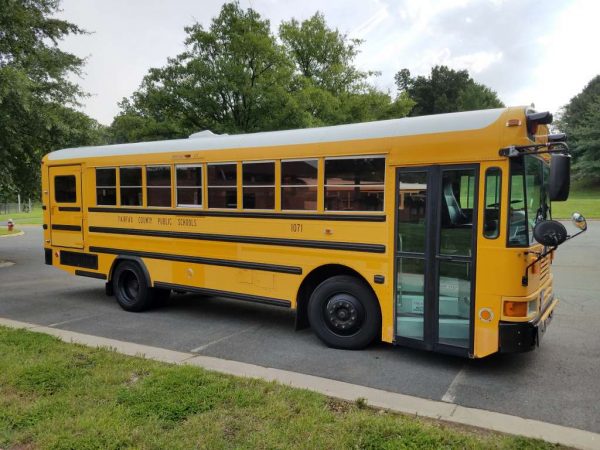
In a presentation to the School Board earlier this week, Superintendent Scott Brabrand announced that some students could begin returning to classes in schools in late October.
By late October, administrators estimate that 653 teachers can teach 6,707 students in school buildings for anywhere between one half-day to four full days a week.
The district is targeting students who receive special education services, attend preschool, are English-language learners, newcomers to U.S. schools or have limited formal education. High school students can also come for certain technical-education courses.
The move was heavily criticized by members of the School Board, who said Brabrand’s plan lacked important data that parents and teachers need when planning to start heading back to school.
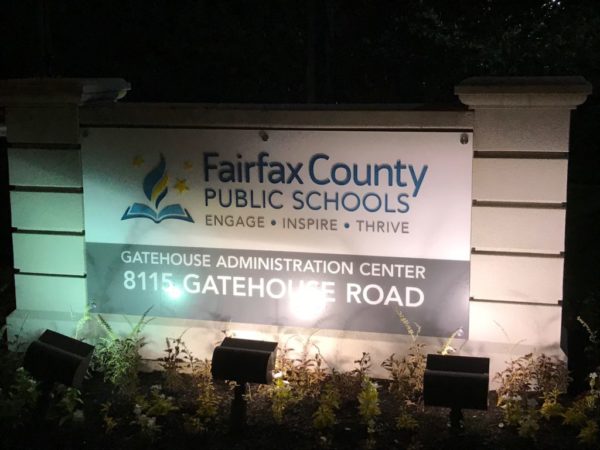
Fairfax County Public Schools must now wait until a formal grievance process has concluded to impose discipline against students and employees found to have committed sexual harassment or assault.
With three members abstaining and one not present, the Fairfax County School Board voted 7-1 on Sept. 17 to amend the FCPS Student Rights and Responsibilities book, which contains the district’s student conduct policies, to specify that discipline in Title IX cases cannot be dealt until the completion of the grievance process, including any appeals.
The board also agreed to discuss its new sexual harassment regulations further at a future work session to potentially bolster protections for both people who file complaints and those subject to the discipline process.
Necessitated by new federal rules regarding Title IX cases, which concern sexual and gender-based discrimination, the Student Rights and Responsibilities amendment is an extension of a new district regulation that dictates how Fairfax County schools will handle sexual harassment complaints.
Effective as of Aug. 26, Regulation 2118 establishes a separate process for reporting, responding to, and resolving sexual harassment complaints than the one used for other offenses, such as drug use and even sexual misconduct that does not meet the definition of harassment.
Where other potential student conduct violations are generally addressed by school principals, formal complaints of sexual harassment will be reviewed by Title IX investigators in the FCPS Office of Equity and Employee Relations, and hearing officers under the superintendent are now responsible for determining whether a complaint is founded and what discipline to impose.
All appeals go to the school board’s appeals committee except for an appeal of a complaint’s dismissal, which would be heard by the district’s deputy assistant superintendent.
Under Regulation 2118, potential disciplinary consequences for sexual harassment and related offenses, including assault, stalking and dating violence or domestic violence, can include expulsion, reassignment, long-term suspension of more than 10 school days, and exclusion from school-sponsored activities.
The new FCPS regulation also requires that any school employee who witnesses or receives a report of sexual harassment report it to their principal or assistant principal. Students and parents are expected to report sexual harassment to the principal or assistant principal, but they can also go directly to the district’s Title IX coordinator.
Upon receiving a report of sexual harassment, a school principal is obligated to contact the complainant to offer options for supportive measures, which range from counseling and seating, locker, or bus reassignments to a no-contact order and scheduling and class changes, and explain the process for filing a formal complaint if they choose.
Principals and other school-based administrators are not involved in the formal grievance process, FCPS assistant division counsel Ellen Kennedy told the school board at its Sept. 17 meeting.
These new procedures bring the Fairfax County public school system in compliance with a new Title IX rule that was issued by the U.S. Department of Education on May 6 and took full effect on Aug. 14.
Title IX of the Education Amendments of 1972 prohibits discrimination based on sex in federally funded education programs and activities. It has been regularly used to combat sexual assault and harassment in schools and colleges, but the Education Department’s new rule represents the first time that purpose has been cemented with a legally enforceable regulation.
While U.S. Education Secretary Betsy DeVos heralded the new rule as a historic step to protect students’ safety and due process rights, sexual assault survivors’ advocacy groups say that it will discourage victims from reporting harassment, shield schools from liability, and make it more difficult to hold perpetrators accountable, according to Inside Higher Education.
Attorneys general from 18 states, including Virginia, are seeking to have the Title IX regulations declared unlawful in a federal lawsuit that was originally filed on June 4. On Aug. 10, a district judge in New York denied the plaintiffs’ request for a temporary injunction to prevent the new rule from taking effect as scheduled on Aug. 14.
Though one of the most-criticized changes — a requirement that officials hold live hearings of sexual assault cases with cross-examinations of both parties — applies just to universities and colleges, Fairfax County school board members made their objections to the new Title IX rule clear even as they passed an amendment to align the district’s policies with federal regulations.
“Broadly speaking, it is the accused who are getting the benefit of the Department of Education’s changes here, and it is the accusers who are being hung out to dry,” Providence District representative Karl Frisch said.
Springfield District Representative Laura Jane Cohen framed her frustrations with the new Title IX regulations through her own experience of being sexually assaulted when she was in sixth grade, an incident that was never formally reported or investigated.
While she believes the Education Department’s new regulations make the process more difficult for people who report sexual harassment, Cohen says the proposed Student Rights and Regulations amendment is the only option currently available to hold people who violate sexual harassment policies accountable.
“It’s crummy, but there has to be something to protect the people who have been sexually assaulted and sexually harassed, our staff, our students, period,” Cohen said. “We have an obligation to those kids, and without this [amendment], there is no recourse for them.”
In addition to altering the Title IX reporting, investigation, and disciplinary procedures used by both K-12 and higher education institutions, the Title IX Final Rule redefines sexual harassment as “any unwelcome conduct that a reasonable person would find so severe, pervasive, and objectively offensive that it denies a person equal educational access.”
That sets a higher bar for what constitutes sexual harassment than the “preponderance of the evidence” standard used by the Obama administration, though sexual assault, stalking, dating violence, and domestic violence allegations do not need to meet the “severe, pervasive, and objectively offensive” threshold.
The Final Rule also directs elementary and secondary schools to require all employees to report notices of sexual harassment and have the investigation of a complaint and the determination of whether the accused student is responsible be conducted by different people.
Braddock District Representative Megan McLaughlin voted against adopting the amendment. Rachna Sizemore Heizer, Abrar Omeish, and Karen Keys-Gamarra, the board’s three at-large members, abstained after raising concerns about a lack of flexibility for handling Title IX cases based on students’ varying needs or circumstances.
Regulation 2118 and the accompanying SR&R amendment lay out specific, systemwide steps for handling sexual harassment complaints. That reduces the risk of policies being applied inconsistently based on the judgment of individual schools and administrators, but the documents also do not differentiate cases based on factors like age, for instance, prescribing mostly uniform reporting and investigation procedures and disciplinary responses for students from kindergarten through 12th grade.
Board members also worried that these regulations could contribute to existing inequities in student discipline, which tends to be applied disproportionately to students of color and students with disabilities.
“This is a problem that I’m very worried about, given many of our students with disabilities who have needs in the social skills area: understanding, reading body cues, body language,” Sizemore Heizer said. “There’s a lot of direct instruction that we need to teach our students with disabilities around consent, around reacting to body language.”
When asked if the board could postpone voting for a public work session or not adopt new Title IX discipline guidance, FCPS division counsel John Foster stated that not complying with federal regulations could put the district at risk of legal action and a loss of federal funding, and the Student Rights and Responsibilities amendment is necessary to determine sanctions for students who engage in sexual harassment.
“If we don’t have a process in place, we’re going to have students who potentially engage in misconduct and don’t face any consequences for it,” Foster said. “That’s just a bad place, I think, for the school system to be and also a bad place for accusers to be.”

As the start date for Fairfax County Public Schools approaches on Sept. 8, school officials are in the midst of developing metrics to guide how and when schools would reopen.
At a Fairfax County School Board meeting in late July, the board directed FCPS Superintendent Scott Brabrand to begin drafting preliminary metrics to inform decisions about school openings and closures.
School officials anticipate a spike in COVID-19 cases in the late fall when flu season prompts more COVID-19 transmissions. Another possibility is “recurring waves across many months until a vaccine is developed,” which could reflect a “loss of stamina” for strict social distancing precautions, according to FCPS documents.
The move comes in the absence of state or county level metrics on the issue. In a recent email, Melanie Meren, school board member for the Hunter Mill District, said this step was taken due to lack of guidance from state officials on the issue.
“Therefore, the school board felt it was vital for FCPS to begin developing our own, because no one else was doing that for or with us,” Meren wrote.
The latest plan for reopening and closures notes that “multi-faceted metric and thresholds” will be used to guide decision-making.
School officials will take several factors into consideration based on community transmission and disease trends, which will determine if the level of community transmissions creates conditions for face-to-face transmission.
Other factors include operational metrics like the school system’s capacity to support in-person instruction, personal protective equipment and cleaning supplies. Finally, school officials will also consider school metrics.
Photo by Annie Spratt/Unsplash
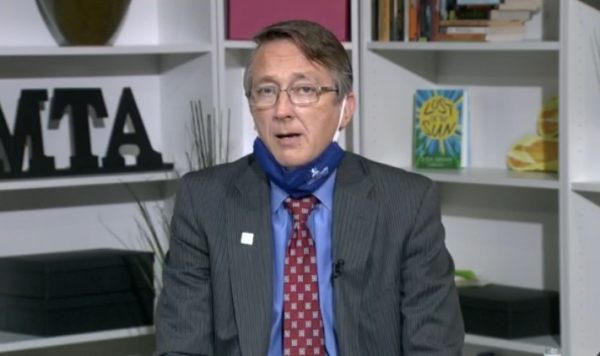
Fairfax County Public Schools Superintendent Scott Brabrand says that the decision for a virtual start to school on Sept. 8 was largely motivated by the health risks associated with COVID-19.
In a letter sent to parents Tuesday, Brabrand said that while cases are relatively stable in Fairfax County, precautionary steps are necessary to ensure the safety of staff and students. FCPS initially planned a hybrid approach of in-person and virtual instruction — a decision that was reversed by Brabrand in late July. The Fairfax County School Board approved the change July 22.
“As educators, there is nothing we want more than to have all students back in school. This school year will be a challenge for us all, but we are doing everything possible to ensure a high-quality education through virtual learning to start the year,” Brabrand said.
Brabrand also said staffing challenges complicated the transition to in-person learning, including the limited availability of substitutes and more leave of absence requests by teachers and other staff.
FCPS staff are developing metrics to determine when and if schools can reopen. Factors under consideration include the trajectory of cases, access to testing, and impact on staff and operations. More details are expected in mid-August, he said.
The school system also plans to provide laptops to all students to use for online learning. Schools will provide information on laptop distribution if a student does not already have an FCPS laptop.
Brabrand said his staff is also exploring ways to boost technical support for families and students, including a help desk for parents. All athletic seasons are also delayed until December.
The entire letter, which includes more details on class schedules and a commitment to more communication, is posted online.
Image via Fairfax County Public Schools
While Fairfax County Public Schools (FCPS) will start the school year virtually, county officials want to make sure students will have continued access to free bus passes.
Fairfax County and FCPS teamed up in 2015 to create a pilot program that gives free Fairfax Connector bus passes to middle and high school students.
“Since its inception, nearly two million trips have been taken through the Free Student Bus Pass Program (FSBPP) and as of February 2020, student ridership accounted for approximately 6.5 percent of the total Fairfax Connector ridership,” according to county documents.
More from the county:
Through this innovative program, students can access extracurricular activities, stay after school for support and tutoring, access after school jobs and internships, and visit libraries, museums, and other recreational activities.
The program familiarizes students with public transportation and supports the development of a more multi-modal generation of young adults in the future. This is critical to increasing transit ridership, reducing traffic congestion, and improving mobility around the National Capital Region.
Fairfax County officials are looking to formalize the collaboration so that the program can continue.
The Board of Supervisors is set to vote on Tuesday (July 28) to approve moving forward with a Memorandum of Agreement between the county and FCPS, according to the meeting’s agenda.
Once the agreement is complete, the county will provide free rides on the Fairfax Connector to students with eligible passes and promote the program, while the school system will register, distribute and manage the passes.
In addition to the pilot program with Fairfax Connector, the county also works with the Washington Area Transit Authority (WMATA). In 2018, the county and WMATA expanded the bus pass program to include Justice High School in Falls Church.
Starting with the 2018-2019 school year, students now receive the bus pass in the form of a “specially designed SmarTrip Card,” according to Fairfax County’s website.

The Fairfax County School Board voted to start the school year virtually late today (Tuesday), reversing its previous plans for virtual and in-person instruction.
Fairfax County Public Schools Superintendent Scott Brabrand pitched the proposal at a school board meeting today. The change was primarily motivated by a surge in new coronavirus cases. Brabrand also noted that he was concerned many of the school system’s staff would not return for in-person instruction.
Here’s more from Brabrand’s letter, which was sent to parents and the school community last night:
The online school year will begin, as scheduled, September 8. Should health conditions improve, we would first bring back students for intervention supports on a limited basis. Following that, we would work to bring students back to school as soon as possible starting with elementary school students, select PreK-12 special education students and English Learners.
This was not an easy decision, but after reviewing the best available health data and continuing to gather input from teachers, staff, students, and families, we have determined that full-time online instruction is the only safe option at this time. The pandemic looks much different now than it did even three weeks ago. Although infection rates in Fairfax County have declined and are relatively stable, 33 percent of our employees live outside the county. The threat posed by the virus does not recognize borders or boundaries.
We know this is very disappointing news for the families who chose the two-day-a-week in-person learning option in our recent preference questionnaire. We all want in-person learning to resume as quickly as possible. We will reassess health conditions regularly to determine when students can begin in-person instruction, if science and data suggest it is safe to do so.
Initially, parents were instructed to choose between an online-only approach or a mix of virtual and in-person instruction.
Schools are expected to start virtually. After the first quarter, the school system’s leadership will reassess the situation.
“Should health conditions improve, we would first bring back students for intervention support on a limited basis,” according to the presentation.
The Fairfax County Federation of Teachers lauded Brabrand’s proposal and the school board’s decision.
“Everyone, but nobody more than our educators, want to open schools and get all kids back as quickly as possible, but we must open schools as safely as possible. Unfortunately, the health crisis doesn’t make in-person classes possible right now,” Tina Williams, the FCFT’s president, wrote in a statement.
Brabrand said the school system is improving its digital learning model.
“We will dedicate ourselves to spending the weeks before September 8 preparing resources and help for parents and students. We will provide additional training for our teachers to better meet the needs of our students and provide distance learning supports and guidance for our families,” he said.

Comstock Secures New Loan for BLVD — “Comstock Holding Companies’ capital markets group secured a $73 million loan with Federal Home Loan Mortgage Corporation (Freddie Mac) for the BLVD I luxury apartment tower, which is located at 1908 Reston Metro Plaza. The new 10-year loan replaces a maturing construction loan provided by Citizens Bank.” [Reston Patch]
Herndon Police Department Closed Today — The department’s office will be closed tomorrow in observance of Juneteenth. Officers and dispatchers will remain on duty to serve the community. [Herndon Police Department]
School Board Considers New Religious Holidays for Calendar — “The Fairfax County School Board is considering a 2021-22 Standard School Year Calendar that was developed with a focus on instruction and learning for students and includes four religious observance holidays. Two options for the 2021-22 school year were presented to the Board at its business meeting on June 18.” [Fairfax County School Board]
Photo by Ray Copson
Updated 6:25 p.m. — Corrects a reference to the survey as a study and that the 825 were FCPS staff members — not all teachers.
After COVID-19 disrupted Fairfax County Public Schools (FCPS) earlier this spring, teachers, staff and school board members are trying to find ways to offer more mental health support.
Throughout the last several months of remote learning, the focus has been on a combination of peer-led programs, remote family check-ins with school-sponsored mental health staff and a message of “resiliency,” according to Bethany Koszelak, a mental health specialist for FCPS.
“Yes, this has been hard on a lot of people, but most youth are resilient and bounce back,” she said, adding that FCPS has been coordinating with teachers to keep an eye on students who might need help.
Mental Health Chain of Command in FCPS
In the FCPS system, regardless of age or year, students typically have access to a therapist, psychologist and social worker who can provide social-emotional support.
Counselors, which Koszelak considers to provide something called “tier one” support, provide guidance lessons to cope with emotions and social issues. If students need additional support, they will be referred to the school-sanctioned therapists and psychologists by the counselors.
As the county’s school board considers a boost in funding for social-emotional learning in the next school year, part of the funds — if approved in the next few weeks — would go toward hiring more staff and possibly bringing on additional mental health professionals full time, according to Koszelak.
Though nothing is set in stone, Karl Frisch, who presents the Providence District on the school board, said he wants to improve the infrastructure for mental health.
“The last several months have likely caused some trauma here and we need to be in a position to respond to it,” he said. We anticipate students will have an increased need.”
Rising Demand for Mental Health Support
Though Koszelak said she doesn’t have statistics to back up an increase request, a survey released by the Fairfax County Federation of Teachers reported that 55% of the 825 staff members who responded said that their students’ mental health had deteriorated since the start of distance learning.
Still, students are not the only ones at risk for mental health challenges.
More than 90% of the teachers said that their stress level has increased since the start of distance learning in March.
“Respondents chose school counselors to have the highest positive direct impact on student mental health and social-emotional needs, followed by social workers, psychologists and parent liaisons,” the survey takeaway said, backing up the school board’s idea.
Among top sources of stress for teachers, many said that they felt anxiety over technology failures, a lack of direction from FCPS leadership and difficulty adjusting to new technology.
“They need to check in with teachers and really care how we’re doing. Right now, the only message we hear is you’re failing. Not providing mental health support to elementary during this time is so WRONG! These kids need it just as much as the middle and high school kids… If anything, we will all need increased mental health support when returning to school because we are all struggling right now,” one survey respondent wrote.
FCFT sent the survey results to Tysons Reporter on May 12, before the murder of George Floid that re-sparked wide-spread outrage over systemic racism and police brutality.
It is unclear how this might add a toll to students/staff mental health but Koszelak said that there are options for students to incorporate discussions about civil rights and current events in the classroom. She added that students even begin to learn about civil rights and Martin Luther King Jr. in the second grade.
Meeting an Invisible Need
In reality, though, the need for help is likely elevated since Frish said that students and families don’t always know how to ask for help when they need it or even realize that it could help.
Around the country, statistics show that issues like domestic violence and child abuse have risen since the start of lockdown since places like child care centers, schools and offices that would typically recognize signs of abuse in-person are closed.
“Children are specifically vulnerable to abuse during COVID-19. Research shows that increased stress levels among parents [are] often a major predictor of physical abuse and neglect of children,” the Substance Abuse and Mental Health Services Administration said in an online article.
To combat this, FCPS teachers were told to look for signs of violence and abuse while interacting with their students over Zoom, Koszelak said, noting that if a student wasn’t coming to class, a school counselor would be sure to reach out to the family.
“The teachers still had live video conference calls with students,” according to Koszelak. “You can gauge when there are some concerns and the teachers know there are protocols to reach out to the clinicians.”
In addition to basic screening measures, FCPS mental health experts were also keeping a keen eye on families with a history of known problems, she added.
Additional Resources for Students and Families
FCPS offers a variety of programs to assist both students and families.
They include:
- Parent Resource Center: tips on how family support will benefit students
- KOGNITO: a walk through difficult conversations with students
- Student Voice Campaign: student sourced media on healthy coping mechanisms
- Mental Health First Aid for youth
- Our Minds Matter Virtual Club Meeting
- Parent Wellness Consultations: for middle and high school students
Some of these resources are met with concerns though: “I did Mental Health First Aid training several years ago, but it was never implemented at my school,” one teacher wrote in the FCFT survey.
“I think there needs to be widespread training in this program at each school for any and all teachers, coaches, counseling staff, and administrators who are willing and able to handle it because we need as many resources for students and staff as possible,” the teacher added.
Looking Ahead to Upcoming School Year
Though kids are on summer break, the Fairfax County School Board is considering hiring 10 more mental health care specialists and increasing funding for various social-emotional learning programs.
Board members are considering a $7 million addition to the program but it is still uncertain how the money would be distributed.
They are expected to vote on changes and plans for the upcoming school year during the upcoming June 26 meeting, according to Koszelak.
Photo via Kelly Sikkema on Unsplash
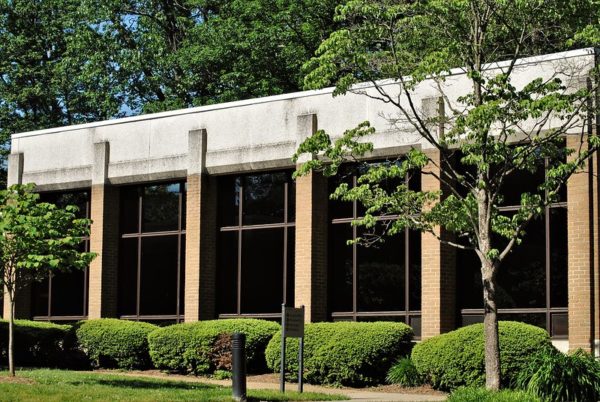
Return to School Public Hearing — The Fairfax County School Board is holding a public hearing on plans to return to school for the next academic year. The virtual meeting is set for Thursday, June 18 at 6:30 p.m. [Fairfax County Public Schools]
Herndon Police Department is Hiring — The local police department is seeking certified police officers to join the department as a lieutenant. [Herndon Police Department]
Current COVID-19 Hospitalizations Dip — “Fewer than 1,000 Virginians are now hospitalized for treatment of COVID-19, and the number of cases continued to slow both statewide and in Northern Virginia, according to reports Saturday morning. The Virginia Hospital and Healthcare Association reported only 959 coronavirus patients in state hospitals, the lowest number since the organization began providing data in early April… Only 342 of those patients were in Northern Virginia, down from a high of 818 on April 30.” [InsideNova]
Reston Association Updates Pool Information — A release posted by the association mistakenly included information that children under eight would not be allowed admission to four pools opening later this month. The press release has been updated. [Reston Association]
Photo via vantagehill/Flickr

Northern Virginia Enters Phase Two — “Eating inside a restaurant, going back to the gym and in-person worship services: Starting Friday, all of these activities will be allowed for residents of Northern Virginia as the region enters phase two of reopening. Businesses and houses of worship will have to adhere to safety standards and capacity limits to lessen the threat that customers could spread coronavirus. Virginia advises that you’re still safer at home.” [NBC4]
The Return to School — Fairfax County Public Schools’ Superintendent Scott Brabrand says that he plans to present the school system’s plan to the school board on Monday. Schools are expected to offer a mix of in-person and online learning. [FCPS]
Deadline for Boat Permits Nears — The registration and renewal deadline for permanent mooring permits is June 30. Reston Association will conduct annual boat monitoring and inspections after June 30. [Reston Association]
Members Sought for Covenants Committee — RA is also seeking members to fill three seats on the committee for a three-year term. The committee administers the use and maintenance of covenants in Reston’s deed. [Reston Association]
Photo via vantagehill/Flickr
To examine the next steps in community recovery and look toward the future after COVID-19, Cornerstones hosted a virtual town hall earlier this week with Fairfax County officials.
As a Reston non-profit organization, Cornerstones helps community members in need of things like food and housing, they work with leaders around the community to achieve mutual goals like One Fairfax.
Officials from the Fairfax County School Board and members of the Fairfax County Board of Supervisors reflected on the economic downturn, consequences for affordable housing and social programs, assistance for those struggling with homelessness, and new resources for students.
Housing
Among some of the largest changes for the board of supervisors, were the cuts to the upcoming fiscal budget, according to Drainsville District Supervisor John Foust.
“The thing that hurt me the most was, as chairman of the housing committee, we had originally planned to put an additional $25 million into the housing fund,” he said.
Many low-income workers, who have been already been hit-hard by COVID will continue to struggle if there isn’t affordable housing available for them, agreed Walter Alcorn and John Foust.
Along the Silver line in Tysons and Reston, Foust said that he and his team are working to lower the income level requirements for workforce housing so more people can afford to live in the area in which they work.
When COVID- 19 shut down the local libraries and other public spaces, Alcon said that this caused the homeless population to become more visible to the public and institutions which aim to help them.
“It made visible a problem our library had been shielding for many, many years,” he said.
Alcorn wants to work with Cornerstones to provide daytime services for homeless people that will allow them to empower themselves and become self-sufficient.
It might take longer to accomplish certain programs but it all depends on priorities, he said. “A priority for me is making sure that our homeless shelter is rebuilt and our library is as well.”
Education and Student Support
For students at-risk students, many of which qualify for free and reduced lunches, the FCPS has instituted a plan to bring in 10 new social workers and a few special education teachers, according to Melanie Meren, the school board representative for the Hunter Mill District.
When the pandemic caused school closures earlier this year, FCPS “nutrition staff began rerouting food supplies and began a very robust program to distribute food,” Elaine Tholen, Drainsville FCPS Board Member said, that county busses were actually dropping food off to disadvantage families at regularly scheduled bus routes.
Until this point, FCPS served around 1.2 million meals and delivered 22,000 laptops to students, according to Tholen.
Going forward, Tholen said that FCPS will be working with teams of bilingual teachers and parent liaisons to ensure that every student has the resources they need to be successful in distance learning.
“We understand that this individualized care is so important,” she said.
Still, county and school board officials remain optimistic about the road ahead.
“When the pandemic first started hitting our community, we really saw a lot of people step up and ask how they could help,” Alcorn said.”We were able to connect a lot of those folks with organizations with Cornerstones.”
Alcorn also noted that he finds it hopeful to see how many people around town who have come out in support of the Black Lives Matter movement after George Floyd’s murder.
“I’ve been to a number of marches and demonstrations within the last week. The feeling is positive without exception,” he said.
Photo via Element5 Digital/Unsplash


